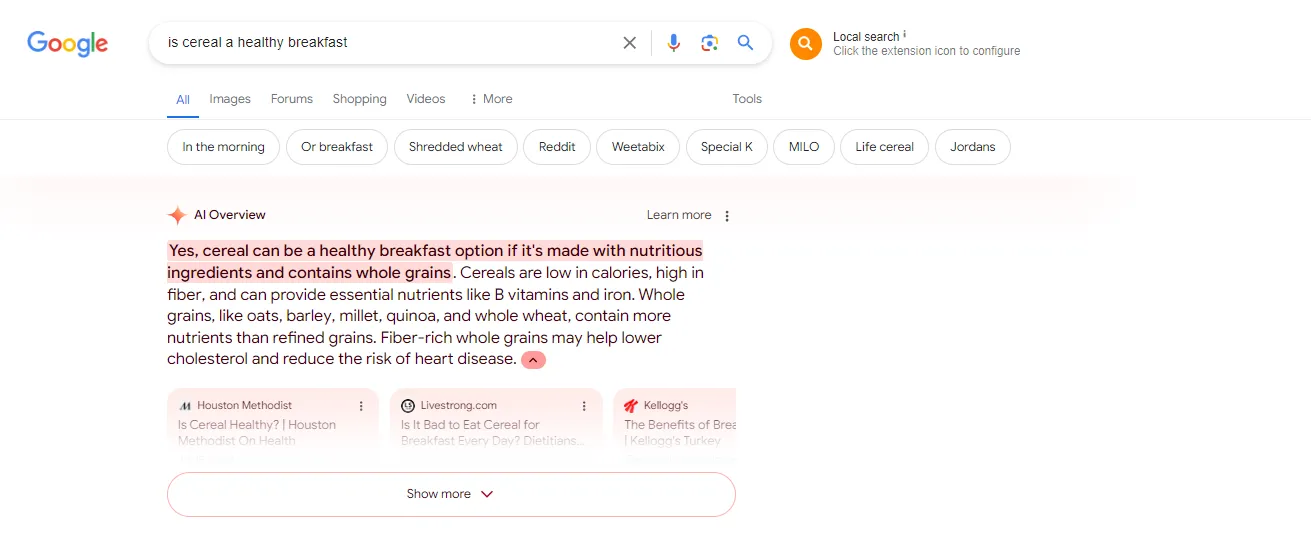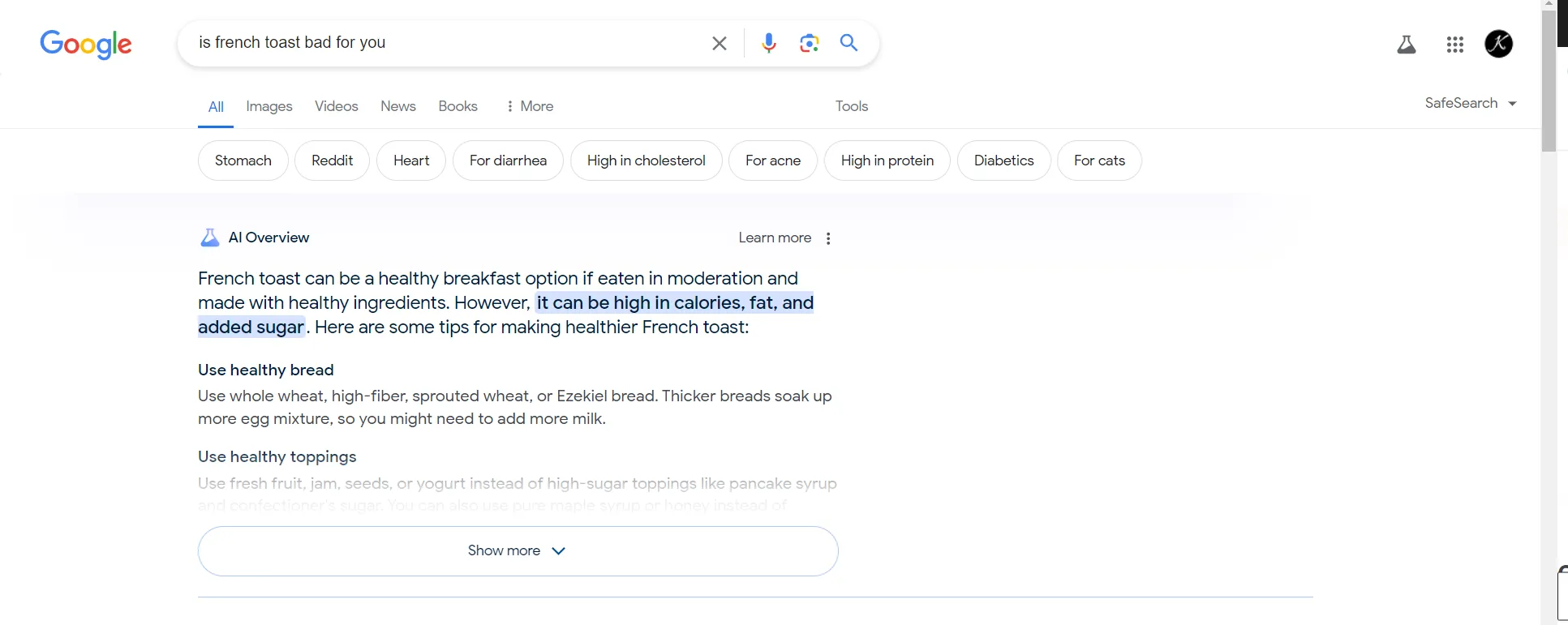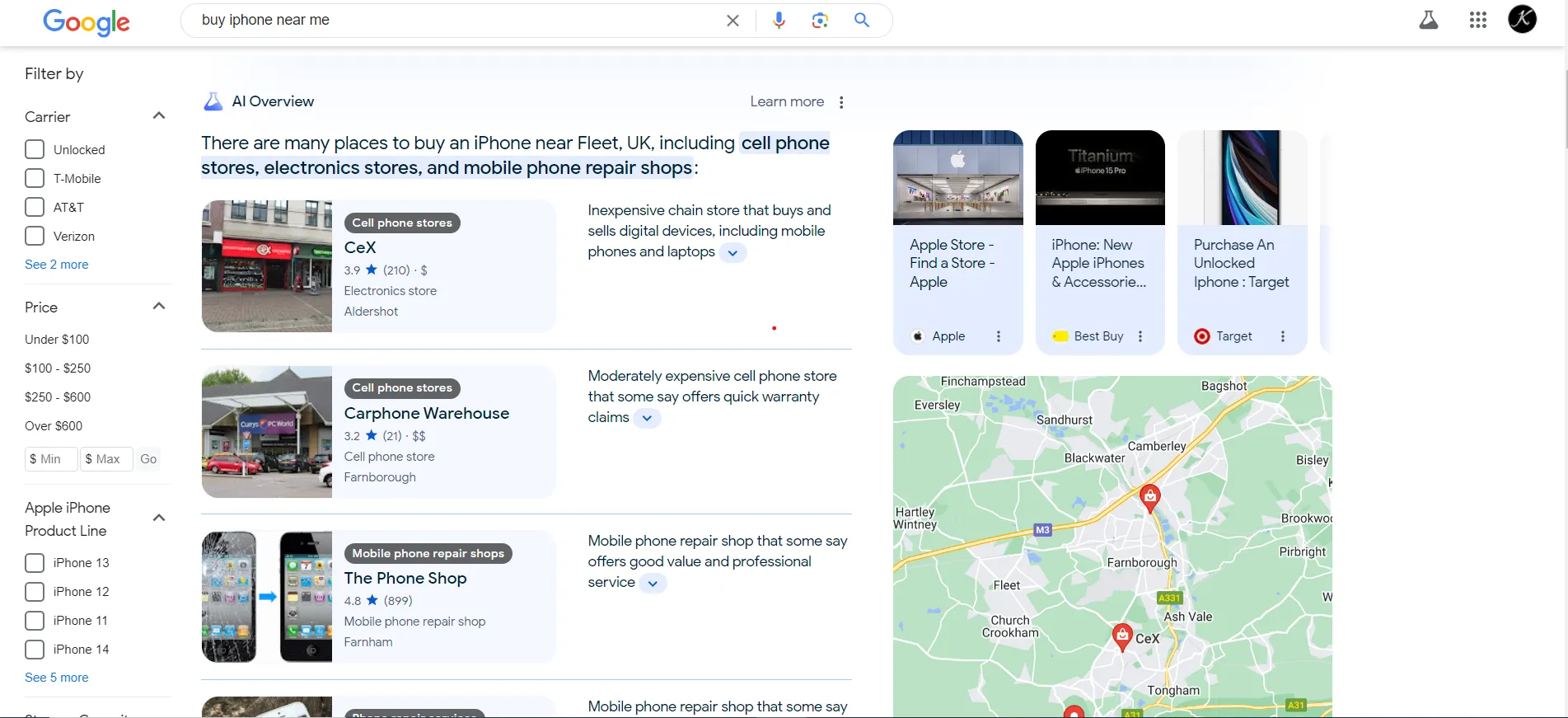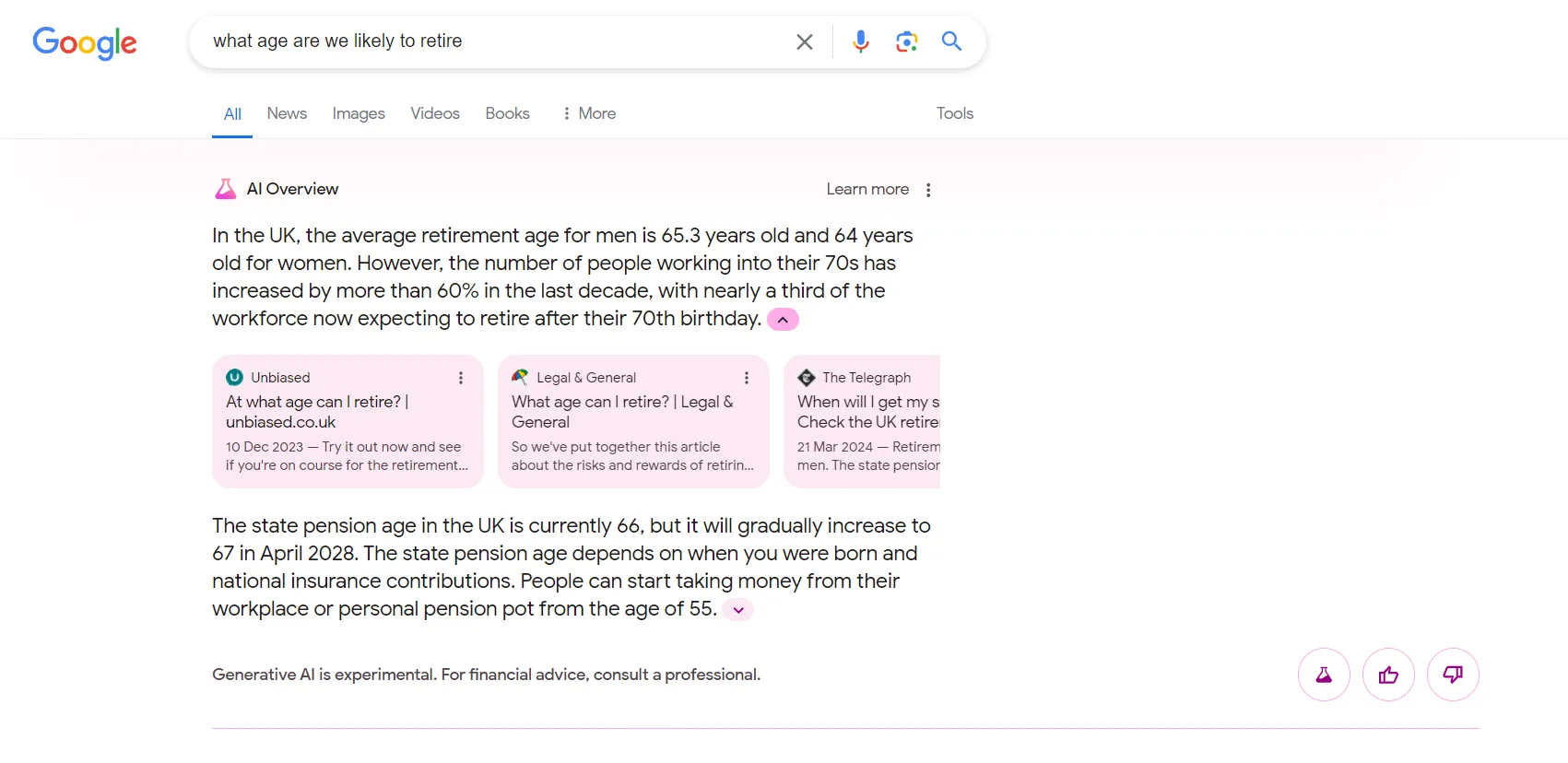After a year in Search Labs, Google’s experimental space, the highly anticipated Search Generative Experience has officially landed in the US search results – with other countries soon set to follow. Read on to learn about Google’s industry-changing announcement and what it means for you.
What is Google’s Search Generative Experience?
If you haven’t heard by now, Google’s Search Generative Experience (SGE) is going to change the face of the search engine. Better serving its users with the use of generative AI in the search results, Google’s aim is to improve search to “take the work out of searching, so you’ll be able to understand a topic faster, uncover new viewpoints and insights, and get things done more easily”.

First announced in May 2023, this change to the search results has been highly anticipated by users and search marketers alike. At the time of writing and for the US only, AI-generated results appear at the very top of the search engine results page (SERP) for certain queries:
Generated by Google’s sophisticated AI model, this section of the search engine results page provides users with information, or an answer to their query, without necessarily needing to click through to websites.
Learn more about how the Search Generative Experience works.
What type of searches trigger it?
SGE is not necessarily present each and every time a user searches, instead, it is triggered by certain types of searches:
Information-Led

Commercial

In our tests, we found that SGE wasn’t triggered for navigational or transactional searches (where users are searching for brands or specific sites for example and more direct buying queries). Interestingly, we also found that although Google stated that Your Money Your Life (YMYL) queries, such as insurance or health related queries, wouldn’t trigger SGE, however we are seeing differently for certain queries:

The Announcement: Google I/O 2024
On the 14th of May 2024 at Google’s annual developer conference, I/O, the tech giant officially announced the industry-changing news: the Search Generative Experience is now live in the US search results and will continue rolling out until the end of 2024.
Liz Reid, Head of Google Search, announced on the 14th of May:
“So today, AI Overviews will begin rolling out to everyone in the U.S., with more countries coming soon. That means that this week, hundreds of millions of users will have access to AI Overviews, and we expect to bring them to over a billion people by the end of the year.”
Changes to SGE
Along with the news that SGE will begin its roll out in the US, some changes were also announced at this memorable conference…
Updated Gemini Model
Google’s SGE utilises the Gemini model (formerly Bard). At Google I/O, they announced changes to this AI model for increased functionality:
“This is all made possible by a new Gemini model customized for Google Search. It brings together Gemini’s advanced capabilities — including multi-step reasoning, planning and multimodality — with our best-in-class Search systems.”
Increased Ability for Complex Searches
This new functionality has meant that SGE has evolved even further. For example, you’ll be able to ask the search engine even more complex questions without having to split these out into multiple searches. Google uses the following as an example of the sort of query you’ll be able to ask:
“find the best yoga or pilates studios in Boston and show me details on their intro offers, and walking time from Beacon Hill.“
More Personalisation
A significant takeaway from this event was that soon SGE will allow you to adjust the SGE result to suit the user. Google suggests using this to simplify language for example if you’re new to a certain topic or for breaking a query down into more detail if needed. This feature enables the user to customise search even further, catering to their needs more than ever before.
Planning Functionality
Another key feature of SGE coming to the search results is the ability to use Google to plan. Google uses the example of creating meal plans, where you’re able to customise the results to suit your needs further, such as considering dietary requirements or tastes. The most interesting part? You can export straight into Google Docs or Gmail – no need to go through a website…
New Text-Based Web Filter
Google also announced a new text-based web filter. This new filter enables users to effectively filter out SGE results, effectively providing a more simplified version of the search results as we know it currently.
So, Is SEO Dead? No – definitely not.
Contrary to what you may be thinking, no, search engine optimisation is not dead. In fact, more than ever it’s needed to understand and navigate this huge change coming our way in the search results to protect organic visibility.
Historically, SEO has faced huge challenges with changes to the search landscape Google has thrown our way (we’re looking at you Penguin and Panda).
There is little to no doubt that this update won’t impact organic visibility in some way, particularly when it comes to top-of-funnel, information-led search. But SEO has always been a challenging space to navigate, which is why it’s crucial to adapt to these changes to protect your site’s visibility more than ever.
Protecting Organic Visibility
Although it is early days, and SGE hasn’t even rolled out to the UK yet, we have a few predictions as to how this may impact organic visibility and areas we should be turning to as it does.
- Information-Led Search – it’s apparent from what we’re seeing from SGE that information-led search is first and foremost the type of query to trigger it. This might make it increasingly difficult to cut through the results for info-led, top-of-funnel search.
- Click-Through-Rate – while SGE does cite its sources, linking to sites, it attributes its results to a number of sites at once. We expect to see a reduction in click-through-rate as users are faced with more and more options (if they follow the sources at all!).
- Value of 1st Position – as the search engine results page gets busier and busier with more features, and 1st position is pushed further down the page due to the size of the SGE result, we may see that 1st position (as we know it now) doesn’t secure as much value as it was once considered.
- Impact to Traffic – With a reduction in click-through-rate and ultimately over saturation of the search engine results page, we might notice a decline in overall traffic to sites, particularly in regard to information-led search.
How will it impact paid search?
While this may be subject to change, at present, Google will continue to display its search ads at the top of the search results page. From research in the industry, ads are appearing above and below the SGE result, which we’ve also found in our own research.
While we expect to see this change mainly impact organic top-of-funnel search terms, with commercial lead search being less affected, we’ll be keeping an eye on this movement.
How to optimise for SGE
If you’re outside the US, then it’ll be a little longer until you can access SGE unless you have a VPN. Exactly when that is, we’re unsure. Typically, the UK and elsewhere works a few months behind updates for the US.
But for when the time comes, how do you best optimise for SGE? We’ve noticed some suggestions amongst the community, however, at this point in time, it’s uncertain how best to optimise for Google’s AI search results and what this means for those in SEO.
In the short-term, SEOs should be preparing to learn from this update. Similarly to a Core Algorithm Update, we shouldn’t jump to make hasty changes. Waiting to collect information is the first step here.
As this update rolls out across the US and further afield, tests and experiments will be needed to see how visibility will be affected for websites. Will featured snippets go? Will 1st position be as valuable? We expect to see a loss in traffic where this type of search is concerned.
How will SEO tools keep up?
SEO tools are currently not necessarily up to standard to work with SGE, so you might notice that your reporting isn’t reflective to what you’re actually seeing in the search results, and what this means for your sites.
It also begs the question of whether tools will be able to crawl SGE answers for reporting – for instance, can they track your site being referenced as a source in an answer? How will they do that? Will position 1 mean as much?
What does SGE mean for you?
This announcement doesn’t just impact those working in search marketing. Anyone that has an online presence in the search results needs to understand how these search result changes may impact your business.
This update will undoubtedly change the way users behave online and interact with websites, and ultimately, your business. While the specifics are unknown at present, businesses should be aware of how this change may impact that visibility and ultimately conversions.
Here’s what John, our Head of Performance has to say regarding this:
“SEO has never been easy. The nature of SEO is such that in any niche there are a relatively small number of winners, so only the best reap the benefit of SEO. The advent of SGE will likely amplify this.“
“It’s not going to make websites obsolete – people will still need to visit sites in most cases to engage with organisations such as to complete a purchase or enquire about a service. And although search is evolving, as long as Google’s organic search offering grants a seat at the table there will be competition to earn that presence.“
“SEO methods will change, but then they’ve never stopped changing. With Google further refining the efficiency of its output for users, the biggest impact will likely be less winners and greater need to help the best get the visibility they deserve.”
Want to future-proof your presence in the search results?
Our team of search marketing experts here at MRS Digital are used to weathering the storm. If you’re unsure what Google’s announcement means for you and are concerned about protecting your visibility in the search results – get in touch.






